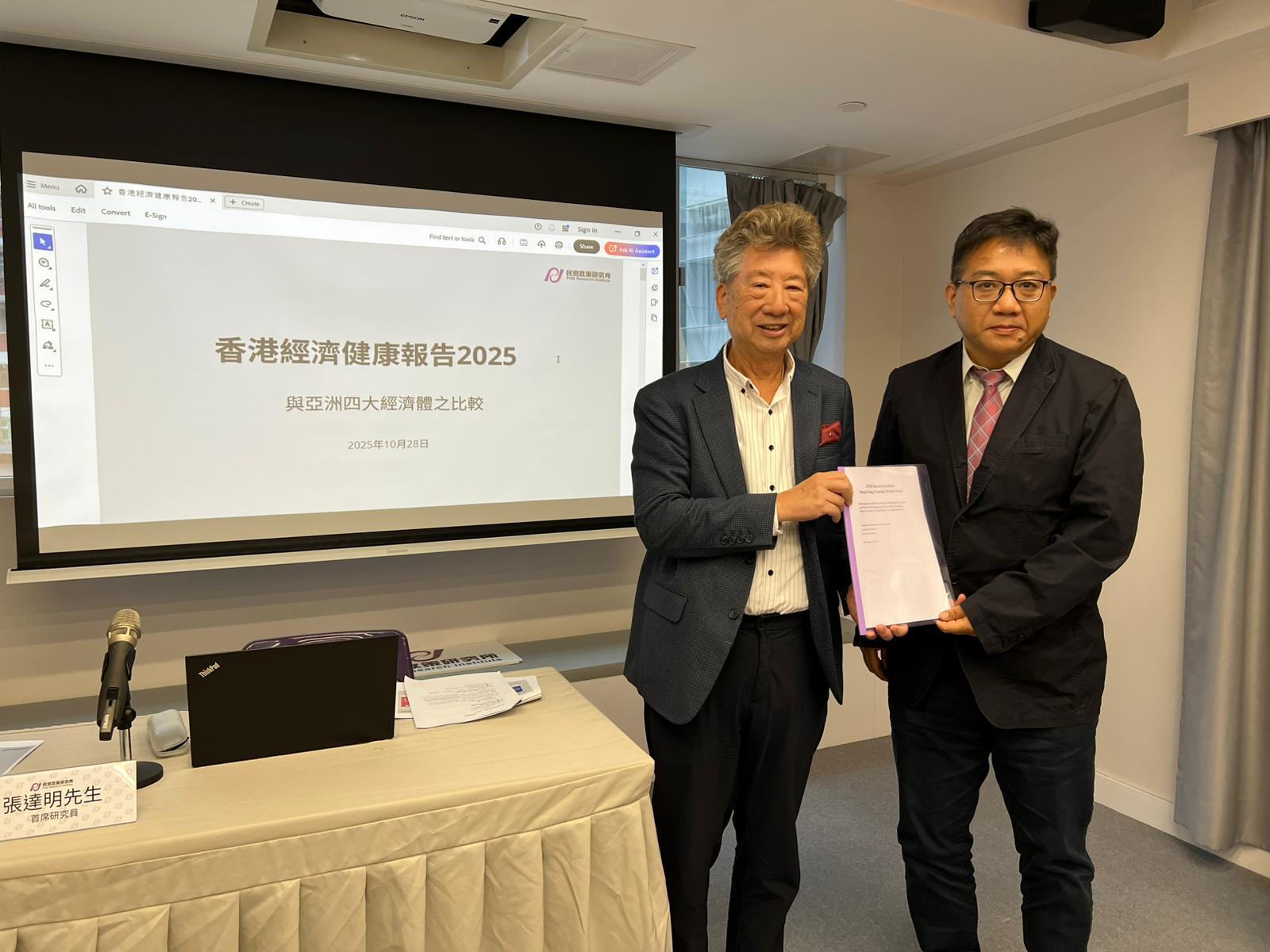【Press Release】
28 October 2025
POD Research Institute Releases Economic Resilience Index:
Singapore Tops, Hong Kong Second
The POD Research Institute (PODRI) has released a new study assessing the economic resilience of five major Asian economies in light of the U.S. imposing global tariffs starting April 2025. The findings have led to the publication of the "Economic Resilience Index," ranking these economies based on their ability to withstand such shocks. Singapore ranked first with an "Outstanding" resilience rating, followed closely by Hong Kong, which received a "Strong" rating. Chinese Mainland, Japan, and South Korea were categorized under a "Moderate" resilience level.
The index evaluates eight equally weighted indicators, including trade performance, foreign exchange reserves, public debt, banking stability, private debt leverage, economic and price stability, financial system integrity, and the ability to withstand U.S. tariff impacts. The final rankings were determined by total scores: Singapore (4.75), Hong Kong (4.13), Chinese Mainland (3.63), Japan (2.75), and South Korea (2.63).
Hong Kong's Strong Rating Supported by Three Key Pillars
Martin Cheung, the Principal Researcher of PODRI, highlighted at the study's press conference that, as a small open economy, Hong Kong has demonstrated significant resilience against tariff shocks. Compared to the 2023-24 situation, its economic resilience index remains at approximately 80%, corresponding to a "Strong" rating. This resilience is primarily attributed to three key pillars:
- Trade Diversification: A gradual shift towards Asian markets and members of the Regional Comprehensive Economic Partnership (RCEP) has kept export activities robust.
- Robust Foreign Exchange Reserves: Coupled with a stringent linked exchange rate system, these reserves are fundamental to maintaining international credibility.
- Strict Financial Regulation: Adequate liquidity in the banking system effectively isolates risks.
In contrast, Singapore's top ranking is supported by its diversified export markets and product range, along with close cooperation with members of the Comprehensive and Progressive Agreement for Trans-Pacific Partnership (CPTPP) and RCEP, effectively mitigating single-market risks. Its clear and coherent policy messaging is also crucial for stabilizing investor confidence.
Analyzing Diverse Pressure Resistance Models and Challenges
The study further analyzes the performance of other economies. The Chinese Mainland exhibits a strong capacity to absorb external shocks, bolstered by substantial foreign exchange reserves, a managed floating exchange rate system, targeted support from state-owned banks, and a large domestic market. Additionally, China has successfully diversified trade, strengthened relations with Belt and Road Initiative countries, and deepened strategic cooperation with Russia, enhancing its geopolitical resilience.
Japan benefits from a capital-rich and well-governed banking system, alongside an extensive network of free trade agreements. Its fully floating exchange rate system allows for adjustments in response to external shocks. South Korea, despite its advanced manufacturing sector and floating exchange rate, faces pressure from U.S. tariffs affecting export profits, compounded by high household debt levels, making it more sensitive to global interest rate cycles.
Strategies for Market Diversification and Financial Autonomy
In light of potential escalations in trade tensions, the study recommends several policy actions. At its core is the need to "deepen the exploration of non-U.S. markets," such as expanding into ASEAN and Middle Eastern markets while establishing traceable re-export service systems. Additionally, enhancing "financial autonomy" by increasing non-U.S. dollar settlements and the use of the renminbi, as well as strengthening currency swap agreements, is essential.
The government should also provide targeted credit guarantees and automatic stabilizers during global economic instability to assist small and medium-sized enterprises in navigating short-term shocks. Accelerating the digitization of trade and the establishment of smart ports will further enhance efficiency and reduce compliance friction.
Building Resilience for Future Challenges
Ronny Tong, Head of PODRI, concluded that both Hong Kong and the Chinese Mainland have demonstrated robust resilience against the initial wave of tariff impacts, leveraging flexibility, policy credibility, and trade diversification strategies. To address future uncertainties, it is crucial to continue reducing dependence on single markets, expand currency options for trade settlements, and accelerate institutional reforms.
Ultimately, Tong noted that the evidence suggests that while U.S. trade tariffs may inflict harm abroad, they also significantly compromise U.S. interests. As the established system of mutually beneficial free trade faces disruption, there may be greater opportunities for international collaboration, potentially marking a pivotal moment in the reorganization of the global order.
Photo: Head of PODRI, Ronny Tong (left) and Principal Researcher of PODRI, Martin Cheung (Right)
Notes: For full report, please refer to: https://podresearch.hk/occasional-papers


 EN
EN Login
Login Donation
Donation

 Back
Back